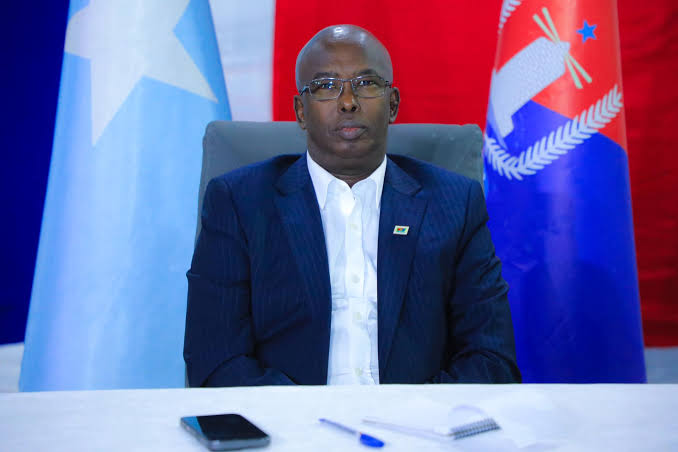Facebook Twitter Instagram Somali Magazine - People's Magazine
Mayor of Mogadishu and Governor of Banadir Region, Mohamed Ahmed Amiir, has dismissed public criticism over the capital’s deteriorating infrastructure and sanitation, arguing that he should not be held accountable since he was not elected by the residents. Speaking at a voter awareness conference in the Somali capital, Amiir emphasized the urgent need for a transition to a one-person, one-vote electoral system, which he believes will ensure accountability and improved governance.
The mayor’s remarks come as frustration grows among Mogadishu residents over the city’s crumbling infrastructure, inefficient waste management, and lack of essential public services. Many blame the federal government’s continued appointment of mayors for weakening local governance and eroding public trust. Amiir, however, countered these claims, stating that an elected leadership would be directly responsible to the people and could address such concerns more effectively.
“You cannot hold me responsible for the poor condition of roads and sanitation in this city,” Amiir stated at the conference. “But if you had elected me, then you would have had the right to demand accountability.”
The mayor further announced that voter registration and polling site markings had been completed in Banadir, signaling progress towards local elections. This move is part of a broader effort to introduce a democratic system where residents of Mogadishu can elect their leadership rather than having it imposed through federal appointments. Somalia has long operated under an indirect electoral system, where government officials and clan leaders control key appointments. However, there is growing pressure to transition towards universal suffrage, particularly in Mogadishu, which remains under federal oversight without a locally elected administration.
Amiir was appointed as the Governor of Banadir Region and Mayor of Mogadishu in December 2024 by President Hassan Sheikh Mohamud, succeeding Yusuf Hussein Jimale “Maddale.” With a background in economics, social development, and administration, he officially assumed office on December 18. Upon his appointment, the president tasked him with advancing the capital’s development, enhancing public services, and preparing for inclusive local elections.
The voter awareness conference, organized by the Banadir Regional Administration, aimed to educate the public about Somalia’s electoral history and the importance of shifting to a one-person, one-vote system. The event was attended by government ministers, lawmakers, district commissioners, religious scholars, youth leaders, and representatives of marginalized communities, all of whom expressed support for electoral reforms.
Somalia’s Minister of Internal Security, Abdullahi Sheikh Ismail Fartaag, noted that Banadir’s preparations for direct elections could set a precedent for the rest of the country. “The preparation of the Banadir Regional Administration and the community for direct elections will open the door to one-person, one-vote elections throughout Somalia,” Fartaag said.
Despite being the political and economic heart of Somalia, Mogadishu does not have the same governance structure as other federal member states, where leaders are selected through indirect elections. Instead, the capital’s mayor has historically been appointed by the president, a practice that critics argue lacks transparency and undermines local representation.
For decades, Somalia’s electoral system has been based on clan-based indirect elections, where elders and delegates select members of parliament, who then elect national leaders. While efforts to implement universal suffrage have been ongoing, political disputes and security concerns have consistently delayed progress. Critics argue that this system weakens governance, fosters corruption, and hinders the delivery of basic public services.
Mogadishu residents have long endured unpaved roads, inadequate drainage systems, and unchecked waste accumulation, which have contributed to worsening living conditions. Many believe that an elected mayor would be more motivated to address these issues, given the direct accountability to voters. Proponents of electoral reform argue that shifting to a democratic system would encourage better governance and development, ultimately improving the quality of life in the capital.
As Somalia continues to navigate its complex political landscape, the push for direct elections in Mogadishu represents a significant step towards democratic reform. Whether these efforts will materialize into meaningful change remains to be seen, but for now, Mayor Amiir’s call for an electoral transition has reignited the debate on governance, representation, and public accountability in the nation’s capital.

